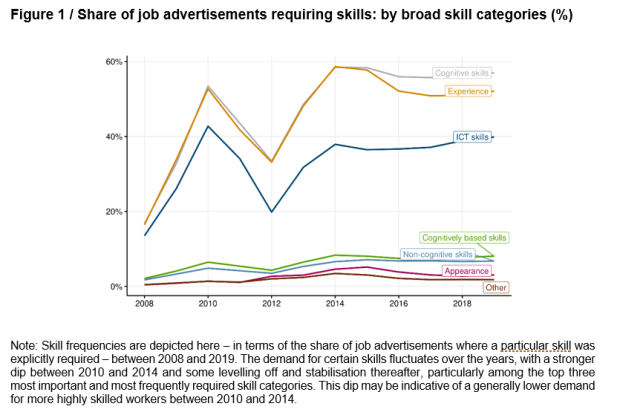Evidence of changing demand for skills among Austria’s firms
03 December 2020
Austrian employers are increasingly requiring more formal education, work experience, and ICT and language skills from potential employees.
By Sandra M. Leitner and Oliver Reiter
Photo: iStock,com/Ivan Balvan
wiiw has published a detailed study on Austrian employers’ skills needs and the changes in the relative importance of different skill types specified in online job advertisements between 2008 and 2019. These are the key findings:
- Austrian employers are quite demanding and require a diverse set of skills from would-be employees.
- Over the past 15 years, Austrian employers have increasingly come to require formal education, previous work experience and information and communications technology (ICT) skills from potential employees. In 2019, these top three skill categories appeared in every second job advertisement.
- The COVID-19 pandemic will increase the demand for ICT skills even further.
- Austrian employers also attach great importance to language skills.
- The soft skills that Austrian employers seek most frequently are an ability to work as part of a team, communication skills, independence, flexibility and accuracy. By contrast, they ascribe little importance to determination, ambition, ability to deal with conflict, and perseverance.
- Education and training systems need to respond to the growing demand for more formal education in general, and for ICT and language skills in particular, in order to ensure that people acquire the skills that employers are increasingly demanding.
The study uses detailed information from over 1.5 million job advertisements on Austria’s largest online job portal (karriere.at) to analyse employers’ skills needs between 2008 and 2019. Online job advertisements are ideal for this analysis: since employers who post job vacancies on websites do not pay by the word, they are more explicit about the particular knowledge, skills and expertise they require of their future employees, as well as about the personal attributes and soft skills or personality traits that they are seeking. This allows a taxonomy to be developed, with four observable skill classifications, covering 1) ICT skills, 2) cognitive skills, 3) cognitively based skills and 4) non-cognitive (soft) skills. However, it also takes account of other factors that frequently appear in job advertisements, such as previous work experience, physical appearance, and the willingness to travel or to work overtime, weekends or shifts, among other things.
Cognitive skills (i.e. formal education), previous work experience and ICT skills are those most frequently required by employers, who also expect their (future) employees to possess all three of the top categories simultaneously (Figure 1). Over the past 15 years, these three skill categories have become increasingly important to Austrian employers: the frequency with which job advertisements stipulated cognitive skills or previous work experience almost tripled between 2008 and 2019 (from 18% to around 50%), while the demand for ICT skills more than doubled (from around 15% to around 40%). This increased demand for ICT skills is a result of the ongoing digital transformation and the greater use of all kinds of digital technologies in the workplace. In 2019, the top three skill categories appeared in every second job advertisement.
The COVID-19 pandemic will further increase the demand for ICT/digital skills. The COVID-19 pandemic is fostering the adoption of new technologies and, with it, the demand for digital skills. In response to the COVID-19 pandemic and the measures taken to contain it (such as mobility restrictions, lockdowns), many firms have already digitalised their operations and moved some of their activities online, in order to remain operational and build resilience ready for future crises; many others are expected to follow suit. Many have implemented new technologies that have allowed them to continue to operate by facilitating social distancing in the workplace, and that have enabled remote working from home. The home office will become much more widespread, now that it has been tested on a large scale.
Austrian employers also attach great importance to language skills. Proficiency in written and spoken German and various other languages, particularly English, was stipulated in every second job advertisement.
As concerns soft skills, Austrian employers most frequently seek an ability to work within a team, communication skills, independence, flexibility and accuracy. Ability to work as part of a team is the single most important, appearing in 40% of all job advertisements; it is followed by communication skills and independence, which were specified in every third job advertisement. Flexibility appeared in every fifth job advertisement, while accuracy was sought in every seventh to eighth job advertisement. These skills have shown little, if any, trend behaviour, suggesting that they have always been of great importance to employers.
By contrast, employers ascribe little importance to determination, ambition, ability to deal with conflict, and perseverance. These were consistently the four least important soft skills, appearing on average in only 1% of all job advertisements between 2008 and 2019.
These results have important policy implications: they point to the great and increasing importance of formal education, language skills and ICT skills, which have become a prerequisite in ever more occupations. Hence, to prevent skills gaps and mismatches, education and training systems need to be adapted to the growing need for more formal education in general – and for ICT and language skills in particular – in order to ensure that people acquire the skills that employers are increasingly demanding.

